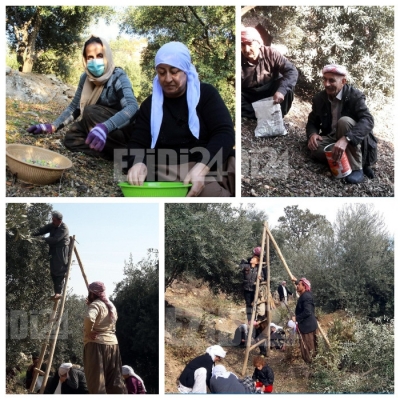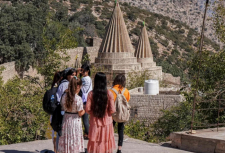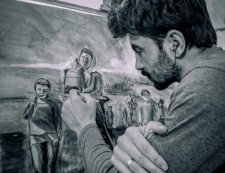With the end of the olive harvest season at the Lalish Temple, the production amounted to more than 10 tons of black olives

Every year, more than three hundred volunteers men and women, participate in the process of picking and reaping the olive harvest in the Lalish Temple as a charitable act for the sake of God.
Mumtaz Ibrahim, an agricultural engineer, and one of the Khalmakarin involved in this work, said in his speech, “Yazidi 24”, “With the end of the harvest season and olive picking in Lalish Temple, production this year has reached more than ten tons.”
Adding by saying, "Olive production depends on the subsidy system, a year the production is abundant and the year after that is less."
Indicating his words by saying, "The Lalish Temple has an olive grove of more than (750) fruitful olive trees."
Ibrahim indicated that "throughout the year we follow the orchard in terms of watering, pruning, and combating jungles and diseases that affect trees."
Regarding the filling of the temple’s need of oil, Karim Elias pointed out, the oil extracted from the orchard is not sufficient for the temple’s need, so people continually provide their goodness of oil to continue work.
"Ilias" emphasized, "This oil is used daily to light the holy wicks and lanterns, which number about (365) wicks and lamps on the number of days of the year, as well as on the Yazidi New Year (Secret Sally) and other holidays."
"Kali Eido," one of the participating girls, from the village of Bahzani, said, "We come as women and men from various Yazidi regions to participate in harvesting the olive harvest in the Lalish Temple as good for God’s sake."
On the role of women in this work, Eido added, "We collect the crop from the ground after picking it from the tree, and we filter it from the leaves and impurities."
Regarding the work being restricted to men only, Eido continued, "In many cases we pick olives and help men to work, and the women participating are more than men."
It is worth noting that the Lalish Temple has several annexes, and the olive grove is one of these annexes. Olives are usually picked at the beginning of December of each year, and stored in a special room to be squeezed and extracted from pure oil in April of each year, and men and women participate in this volunteer work. From various Yazidi regions.
Ezidi24
Tags:
With the end of the olive harvest season at the Lalish Temple, the production amounted to more than 10 tons of black olives

Every year, more than three hundred volunteers men and women, participate in the process of picking and reaping the olive harvest in the Lalish Temple as a charitable act for the sake of God.
Mumtaz Ibrahim, an agricultural engineer, and one of the Khalmakarin involved in this work, said in his speech, “Yazidi 24”, “With the end of the harvest season and olive picking in Lalish Temple, production this year has reached more than ten tons.”
Adding by saying, "Olive production depends on the subsidy system, a year the production is abundant and the year after that is less."
Indicating his words by saying, "The Lalish Temple has an olive grove of more than (750) fruitful olive trees."
Ibrahim indicated that "throughout the year we follow the orchard in terms of watering, pruning, and combating jungles and diseases that affect trees."
Regarding the filling of the temple’s need of oil, Karim Elias pointed out, the oil extracted from the orchard is not sufficient for the temple’s need, so people continually provide their goodness of oil to continue work.
"Ilias" emphasized, "This oil is used daily to light the holy wicks and lanterns, which number about (365) wicks and lamps on the number of days of the year, as well as on the Yazidi New Year (Secret Sally) and other holidays."
"Kali Eido," one of the participating girls, from the village of Bahzani, said, "We come as women and men from various Yazidi regions to participate in harvesting the olive harvest in the Lalish Temple as good for God’s sake."
On the role of women in this work, Eido added, "We collect the crop from the ground after picking it from the tree, and we filter it from the leaves and impurities."
Regarding the work being restricted to men only, Eido continued, "In many cases we pick olives and help men to work, and the women participating are more than men."
It is worth noting that the Lalish Temple has several annexes, and the olive grove is one of these annexes. Olives are usually picked at the beginning of December of each year, and stored in a special room to be squeezed and extracted from pure oil in April of each year, and men and women participate in this volunteer work. From various Yazidi regions.
Ezidi24
Tags:


























